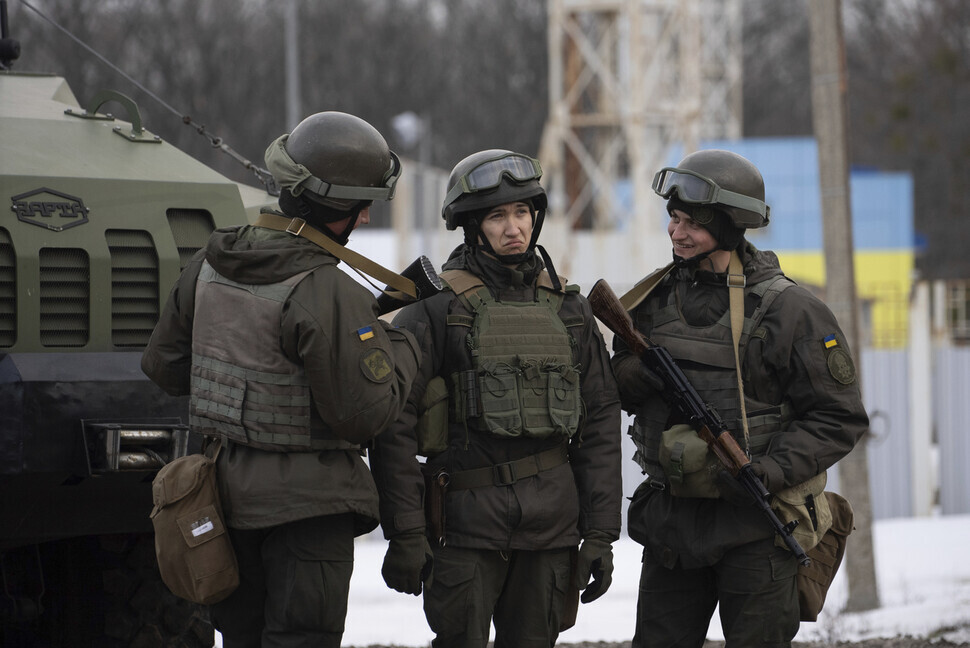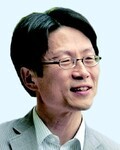hankyoreh
Links to other country sites 다른 나라 사이트 링크
[Column] Crisis in Ukraine and the Korean Peninsula on the brink of the unknown


By Suh Jae-jung, professor of political science and international relations at the International Christian University in Tokyo
Speaking about Russia’s Vladimir Putin on Friday, US President Joe Biden pronounced, “As of this moment, I’m convinced he has made the decision” to invade Ukraine.
The remark came at a point when concerns that the Russian military swarming the Ukrainian border would soon begin its offensive were at their peak. There were even rumors about when and how the Russian military would invade Ukraine. So, on Friday, Biden finally commented on Putin’s “decision.” He said, “We have reason to believe that the Russian forces are planning to and intend to attack Ukraine in the coming week — in the coming days.”
What is Putin thinking? Why is Biden bringing all this out into the open? Will things be okay on the Korean Peninsula and in East Asia?
Russian President Vladimir Putin is playing a dangerous game. Building up over 100,000 of one’s troops near a neighboring country’s border and conducting threatening military drills is nothing but provocative. In the midst of all this, Russia carried out nuclear drills involving the Black Sea fleet and even released photos of Putin supervising the exercise in the Kremlin’s situation room with Belarusian President Alexander Lukashenko.
As it happens, tensions between Ukrainian forces and separatist insurgents are intensifying in Ukraine’s eastern Donbas region, providing even more fodder for war. Whatever the reason, if Russian forces cross the Ukrainian border and begin their offensive, it will constitute an outrage against international law and order concerning territories and borders.
Even the sternest warning wouldn’t be enough. If, by any chance, Russia invades, it will have to pay the appropriate price.
However, whether Putin really made the “decision,” and whether Russia will actually act on the decision, are not set in stone. Rather than sit by and wait for what happens, authorities should cool-headedly analyze why Putin is acting the way he is and come up with a fundamental cure for the problem instead of simply treating the symptoms.
As many analysts have already pointed out, various factors are at play in Putin’s dangerous game. His political ambition, domestic politics and economics in Russia and Ukraine as well as the two countries’ unique relationship, Russian ethnic minorities in Ukraine, the imperfect enforcement of the Kyiv deal — such complex and entangled reasons are motivating Putin right now. But what compounded these reasons to precipitate the current crisis is none other than systemic violence.
That Russia’s military power is more than enough to overwhelm that of Ukraine is a fact all are privy to. Russia’s defense spending alone is 10 times that of Ukraine. This is one of the reasons why Ukraine aspires to join the NATO military alliance. The combined military power of the US and NATO would be more than enough to overpower Russia. The US outspends Russia on its military by a factor of 12. The combined military spending of NATO members the UK, Germany, and France alone amounts to almost three times that of Russia. Russia does have nuclear weapons to rely on, but missile defense systems that can neutralize Russian nuclear weapons are in place in Poland and Romania, and intermediate-range missiles that can reach Moscow in minutes are in the process of being deployed near Russia. In a sense, Russia is Europe’s Ukraine.
This is why Putin is trying to shake up the game. Now that Russia has regained its power compared to its state 30 or so years ago, it’s asserting what it’s capable of, exercising its power to communicate its grievances and bring about adjustments, however small, to the systemic violence it’s subject to. Though it’s making a fuss in Ukraine, Russia plans to propose negotiations to the US and NATO to bring on changes to its present condition.
But the US has no intention of changing up the game yet. The US has invested incalculable resources to establish the current system, and for good reason. That’s why it’s trying to maintain the current system through force. Hence, Russia, which is attempting to shake up the game, is a provocative force in the eyes of the US. The more the possibility of Russia’s invasion of Ukraine is highlighted, the more Russia’s systemic violence against Ukraine will be spotlighted, while the systemic violence of the US will remain hidden in the shadows.
The conflict surrounding Ukraine is a typical example of what happens during global power transfers. Conflict between those trying to shake up the game and those intent on protecting the game won’t be limited to Ukraine, nor will it end within days or weeks. The Taiwan Strait, the South China Sea, and the Korean Peninsula remain as weak links in the global competition for power. Just as a volcano erupts through weak spots on its surface, the weak links can be severed by conflict any day.
Therefore, the situation in Ukraine prompts historical questions for the Korean Peninsula and East Asia. Will they be the weak spots through which a volcano erupts in this time of chaos? Or will they open up a new world despite the whirlwind of confusion?
The Korean Peninsula has struggled with the contradictions of modernity at least from the March 1st Movement of 1919. Right now, the Korean Peninsula is yet again at a crossroads between a familiar future and the dawn of an unknown world.
Please direct questions or comments to [english@hani.co.kr]

Editorial・opinion
![[Editorial] Penalties for airing allegations against Korea’s first lady endanger free press [Editorial] Penalties for airing allegations against Korea’s first lady endanger free press](https://flexible.img.hani.co.kr/flexible/normal/500/300/imgdb/original/2024/0502/1817146398095106.jpg) [Editorial] Penalties for airing allegations against Korea’s first lady endanger free press
[Editorial] Penalties for airing allegations against Korea’s first lady endanger free press![[Editorial] Yoon must halt procurement of SM-3 interceptor missiles [Editorial] Yoon must halt procurement of SM-3 interceptor missiles](https://flexible.img.hani.co.kr/flexible/normal/500/300/imgdb/child/2024/0501/17145495551605_1717145495195344.jpg) [Editorial] Yoon must halt procurement of SM-3 interceptor missiles
[Editorial] Yoon must halt procurement of SM-3 interceptor missiles- [Guest essay] Maybe Korea’s rapid population decline is an opportunity, not a crisis
- [Column] Can Yoon steer diplomacy with Russia, China back on track?
- [Column] Season 2 of special prosecutor probe may be coming to Korea soon
- [Column] Park Geun-hye déjà vu in Yoon Suk-yeol
- [Editorial] New weight of N. Korea’s nuclear threats makes dialogue all the more urgent
- [Guest essay] The real reason Korea’s new right wants to dub Rhee a founding father
- [Column] ‘Choson’: Is it time we start referring to N. Korea in its own terms?
- [Editorial] Japan’s rewriting of history with Korea has gone too far
Most viewed articles
- 160% of young Koreans see no need to have kids after marriage
- 2Months and months of overdue wages are pushing migrant workers in Korea into debt
- 3[Editorial] Penalties for airing allegations against Korea’s first lady endanger free press
- 4Presidential office warns of veto in response to opposition passing special counsel probe act
- 5Historic court ruling recognizes Korean state culpability for massacre in Vietnam
- 6Hybe-Ador dispute shines light on pervasive issues behind K-pop’s tidy facade
- 7Japan says it’s not pressuring Naver to sell Line, but Korean insiders say otherwise
- 8[Guest essay] How Korea must answer for its crimes in Vietnam
- 9Story of massacre victim’s court victory could open minds of Vietnamese to Korea, says documentarian
- 10Historic verdict on Korean culpability for Vietnam War massacres now available in English, Vietnames